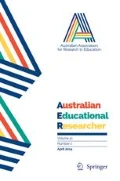Abstract
In this paper I am concerned with the challenge workplace learners and educators face, as they engage with global economies, to create ‘a world in common as … known in common’ (Smith 1999). I focus first on why global companies need their geographically dispersed workers to engage with a world ‘in common’, and how they go about constructing such a world. I pay particular attention to the role of written texts in connecting individual local sites with global discourses of knowledge production. Next, I explore the roles that workplace educators play in producing and interpreting the written texts of contemporary workplaces to produce ‘working knowledge’. I develop the argument that a critical dimension of the work of many workplace educators is the standardisation of language practice across institutions on a global scale, mediating local and global discourses to produce and use working knowledge. Finally, I discuss the political implications of the textual work that workplace educators undertake.
Similar content being viewed by others
References
Alvesson, M. (1993) Organization as rhetoric: knowledge-intensive firms and the struggle with ambiguity,Journal of Management Studies, vol. 90, pp. 997–1016.
Bakhtin, M. M. (1981)The Dialogic Imagination, University of Texas Press, Austin. Covisint Online, Online: (http://www.covisint.com (Accessed 14 January 2001)./01/01)
Davenport, T. H. and L. Prusak (1998)Working Knowledge:. How Organizations Manage What They Know,. Harvard Business School Press, Boston.
Deetz, S. (1995)Transforming Communication Transforming Business: Building Responsive and Responsible Work Places, Hampton Press, Cresskill, New Jersey.
Engestrom, Y. and D. Middleton, eds. (1996)Cognition and Communication at Work,. Cambridge University Press, Cambridge.
Fairclough, N. (1996) Technologisation of discourse, in C. Caldas-Coulthard and M. Coulthard, eds.,Texts and Practices, Routledge, London.
Farrell, L. (2000) Ways of doing, ways of being: language, education and ‘working’ identities,Language and Education, vol. 14, no. 1, pp. 18–36.
Farrell, L. (2001a) Negotiating knowledge in the knowledge economy: workplace educators and the politics of codification,Studies in Continuing Education, vol. 23, no. 2 201–214. vol. ??, pp. ??.
Farrell, L. (2001b) The ‘new word order’ — the textual practice of economic globalisation and workplace education,Pedagogy, Culture and Society, vol. 9, no. 1, pp. 57–77.
Farrell, L. (2002) ‘Making Knowledge Common’, in Annual AVETRA Conference Proceedings, Caulfield, Victoria, Australia.
Farrell, L. B. Kamler, et al and T. Threadgold. (2000) Telling tales out of school: women and literacy in ‘new times’,Studies in the Education of Adults, vol. 32, no. 1, pp. ??78–92. Ford online, Online: (wysiwg://58http://www.ford.com/...ford/index.jsp?SECTION=ourCompany (Accessed 2.11.01 November 2001 11.21 am). Ford Supplier Network Page, Online: (https://fsn.ford.com/default.html)
Lesser, E., M. Fontaine and J. Slusher, eds. (2000)Knowledge and Communities, Butterworth-Heinemann, Oxford.
Lesser, E. and L. Prusak (2000) Communities of practice, social capital and organisational knowledge, in E. Lesser, M. Fontaine and J. Slusher, eds.,Knowledge and Communities, Butterworth-Heinemann, Boston.
Nonaka, I. and H. Takeuchi (1995)The Knowledge Creating Company, Oxford University Press, New York.
Roberts, J. (2001) The drive to codify: implications for the knowledge-based economy,Prometheus, vol. 19, no. 2, pp. 99–116.
Smith, D. (1999)Writing the Social. Critique, Theory and Investigations, University of Toronto Press, Toronto.
Wellman, B., J. Salaff, D. Dimitrova, L. Garton, M. Guila and C. Haythornthwaite (2000) Computer networks as social networks: collaborative work, telework and virtual community, in E. Lesser, M. Fontaine and J. Slusher, eds.,Knowledge and Communities, Butterworth-Heinemann, Boston.
Wenger, E. (1999) Communities of practice: the key to knowledge strategy.,Knowledge Directions: The Journal of the Institute for Knowledge Management, vol. 1, Fall, pp. 48–63.
Author information
Authors and Affiliations
Rights and permissions
About this article
Cite this article
Farrell, L. Knowing a world in common: The role of workplace educators in the global production of working knowledge. Aust. Educ. Res. 30, 3–18 (2003). https://doi.org/10.1007/BF03216778
Issue Date:
DOI: https://doi.org/10.1007/BF03216778




